Encounters with conflict and peace
The role of the west
In 1993 a peace-keeping mission in Somalia went horribly wrong. Many people were killed or injured. Wounded US soldiers were surrounded by jeering armed mobs.
This happened two days before the UN security council was due to decide whether or not to send peace-keepers to Rwanda. With the support of Russia and the UK, America insisted on only a small, cheap peace-keeping effort. It would be limited to Rwanda’s capital city, Kigali, and there would be no seizing of weapons - only observing.
For Rwandans, the timing could not have been worse…
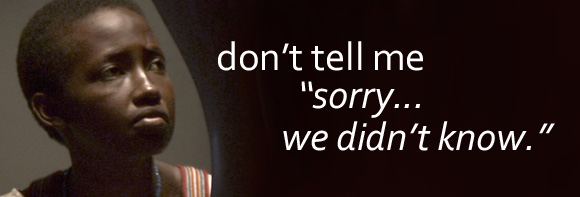

The Rwandan Armed Forces (FAR) and Hutu militia (the interahamwe) set up roadblocks and go from house to house killing Tutsis and moderate Hutu politicians. Ten Belgian soldiers with UNAMIR, assigned to guard the moderate Hutu Prime Minister, are tricked into giving up their weapons. They are tortured and murdered.
A wave of violence spread across the country. Alisa’s family, with thousands of other terrified Tutsi, took refuge in the Catholic church at Ntarama. Alisa said, "we all thought that if we came into the house of God maybe no-one would touch us, so everywhere around this place was crowded with people."

Estimated death toll 8,000

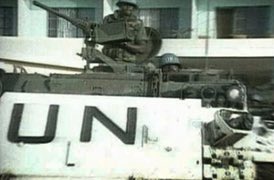
One day, in Nyamata, armoured cars finally came to collect the white Fathers. In the main street, the interahamwe believed that they had come to punish them and they fled, yelling at one another that the Whites were here to kill them. The tanks did not even stop for a Primus break to have a laugh about the misunderstanding. Also, a few weeks later, the Whites sent professional photographers to show the world how we had been massacred.
So you may understand that into the survivors' hearts there slipped a feeling of abandonment that shall never go away, but I do not want to anger you with this.”
From The Survivors Speak, by Jean Hatzfeld
On Monday 11th April, the militia and the army attacked the crowds in the church compound. Alisa said, "there was a very big noise, and then everyone got down on the ground and they came in and started doing their thing...
There were many bullets - and grenades - I could hear people screaming. I could hear it in the back of my head... really, it was very bad."
About 5,000 people were killed here that day, including many of Alisa’s family. She escaped into a nearby banana plantation.
There were many bullets - and grenades - I could hear people screaming. I could hear it in the back of my head... really, it was very bad."
About 5,000 people were killed here that day, including many of Alisa’s family. She escaped into a nearby banana plantation.
Estimated death toll 32,000

Estimated death toll 64,000

Alisa has taken her 9 month old baby girl and joined thousands of others hiding from the killers in the malaria infested marshes of the Nyabarongo River. She said, "every day in the swamp, many teams of killers would come looking for people to kill, because they knew we were hiding there. Every day we jumped over corpses to escape from them."
Estimated death toll 112,000

General Anyidoho, a Ghanaian, refuses to leave Rwanda, disobeying Ghanaian law and UN central command, but supporting UNAMIR and Dallaire and ordinary Rwandans.
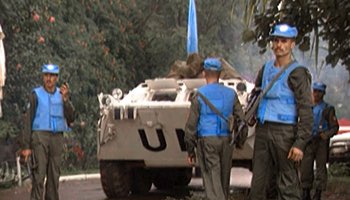

Her response carefully tries to avoid the word: "the use of the term 'genocide' has a very precise legal meaning, although it's not strictly a legal determination. There are other factors in there as well…we have to undertake a very careful study before we can make a final kind of determination…"
Later, the U.N. Security Council passes a resolution condemning the killing, but omits the word "genocide."
Estimated death toll: 168,000


The head of UN peacekeeping, Kofi Annan, says, “we are watching people being deprived of the most fundamental of rights, the right to life, and yet we seem a bit helpless ..."
Estimated death toll: 200,000

Estimated death toll: 232,000
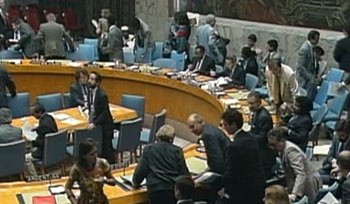

Estimated death toll: 328,000

Mike McCurry, State Department spokesman, is asked at a press briefing, "has the administration yet come to any decision on whether it can be described as genocide?"
He answers, "I'll have to confess, I don't know the answer to that. I know that the issue was under very active consideration. I think there was a strong disposition within the department here to view what has happened there; certainly, constituting acts of genocide that have occurred ..."
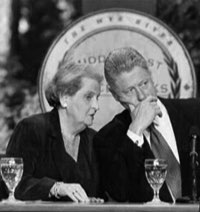
Estimated death toll: 392,000

"That's just not a question that I'm in a position to answer."
"Well, is it true that you have specific guidance not to use the word 'genocide' in isolation, but always to preface it with these words 'acts of'?"
"I have guidance which I try to use as best as I can. There are formulations that we are using that we are trying to be consistent in our use of. I don't have an absolute categorical prescription against something, but I have the definitions. I have phraseology which has been carefully examined and arrived at as best as we can apply to exactly the situation and the actions which have taken place ... "
As the killings continued, the French government continued to supply weapons through eastern Zaire (DR Congo). President Francois Mitterrand said, "In such countries, genocide is not too important."
(reported in the newspaper Le Figaro)

“While I was talking about the ongoing genocide, [the French] staff were raising points about the loyalty France owed to old friends,” Dallaire (shown right) reported. “They refused to accept the reality of the genocide and the fact that the extremist leaders, the perpetrators, and some their old colleagues were the same people”.
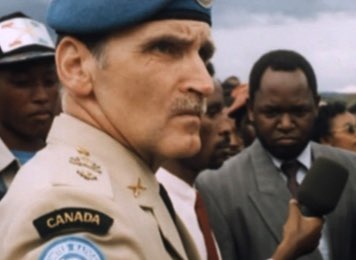
Estimated death toll: 616,000

The genocide is over.
Estimated death toll: 800,000
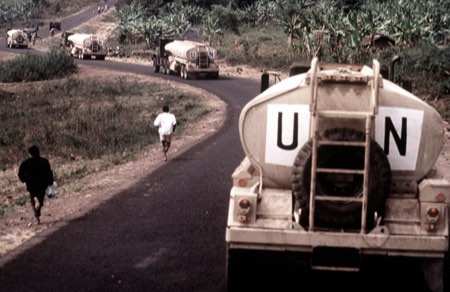
Dallaire watches with a mixture of awe and frustration as planeload after planeload of soldiers, armoured vehicles, water tankers and humanitarian aid arrive at the refugee camps on Rwanda’s borders.
But the world still doesn't understand what they are seeing. Among the innocent are tens of thousands of genocide perpetrators - soldiers and militia - still armed. They rule the camps with fear and brutality. Aid workers find themselves being used as caterers to probably the largest collection of mass murderers ever assembled.

“This tribunal was created essentially to appease the conscience of the international community.” said Charles Murigande, chairman of the Presidential Commission on Accountability for the Genocide.
“The international tribunal was painfully slow to begin work, had great trouble locating and capturing suspects and spent more than $1 billion to try the less than seventy it managed to arrest. Defendants enjoyed private cells, television, and three meals a day.
They also had free access to the world’s finest medical care, meaning that rapists among them who had infected Rwandan women with HIV during the genocide were given expensive antiretroviral drugs, while their victims, mired in Rwanda’s poverty, wasted away and died with little or no care.”
(Stephen Kinzer. A Thousand Hills)
Credits
This timeline draws on a variety of sources, including our own interviews
PBS Frontline Ghosts of Rwanda. www.pbs.org
Linda Melvern. A people betrayed: the role of the west in Rwanda's genocide.
Jean Hatzfeld. Into the quick of life: The Rwandan genocide. The survivors speak
Stephen Kinzer. A thousand hills. Rwanda's rebirth and the man who dreamed it.
Images
UN and Dallaire photos are screengrabs from the film Shake Hands with the Devil, the documentary about Romeo Dallaire.
The photo of the water tankers with UN Markings, Convoy, 501st, Transportation Squadron, 3/325, Airborne Combat Team, South European Task Army Force, Task Force 51. http://farm4.static.flickr.com/3131/3748379631_db2bb997bf_o.jpg
This timeline draws on a variety of sources, including our own interviews
PBS Frontline Ghosts of Rwanda. www.pbs.org
Linda Melvern. A people betrayed: the role of the west in Rwanda's genocide.
Jean Hatzfeld. Into the quick of life: The Rwandan genocide. The survivors speak
Stephen Kinzer. A thousand hills. Rwanda's rebirth and the man who dreamed it.
Images
UN and Dallaire photos are screengrabs from the film Shake Hands with the Devil, the documentary about Romeo Dallaire.
The photo of the water tankers with UN Markings, Convoy, 501st, Transportation Squadron, 3/325, Airborne Combat Team, South European Task Army Force, Task Force 51. http://farm4.static.flickr.com/3131/3748379631_db2bb997bf_o.jpg
< previous page | next page >
In this section
STARTING A GENOCIDE
Whose idea was it?
How did it start?
The foreigners are leaving
Hate radio
DETAILS
Roadblocks
The little things
INSIGHT
A simple plan
This new job
A strangeness of mind
Personalities
A good man
FOCUS ON THE BUGESERA
The Bugesera
Ntarama church massacre
A day in the marshes
MZUNGUS
The role of the west
Two French missionaries
A journalist's story
THE END OF THE GENOCIDE
The refugee crisis
A country with nobody home

Whose idea was it?
How did it start?
The foreigners are leaving
Hate radio
DETAILS
Roadblocks
The little things
INSIGHT
A simple plan
This new job
A strangeness of mind
Personalities
A good man
FOCUS ON THE BUGESERA
The Bugesera
Ntarama church massacre
A day in the marshes
MZUNGUS
The role of the west
Two French missionaries
A journalist's story
THE END OF THE GENOCIDE
The refugee crisis
A country with nobody home




